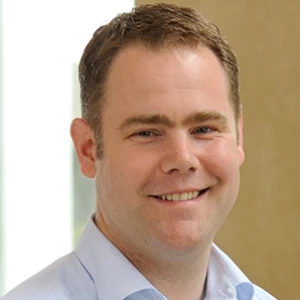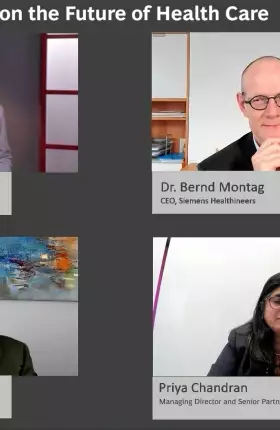Teva Pharmaceuticals is the world’s largest producer of generic drugs, with a portfolio of many thousands of products. The Israel-based company is also a bold innovator of biologics. By making high-quality medicines more affordable and available, Teva is doing its part to improve health care outcomes everywhere.
For this interview, CEO Richard Francis sat down with BCG’s Torben Danger to explain Teva’s bold new growth strategy and how talent will drive it. They also discussed the company’s approach to climate and sustainability. Edited excerpts of their conversation follow.
You took office as president and CEO of Teva earlier this year. Within three months, you developed a strategy for the company. Tell us more about it.
Francis: We've developed a new strategy for Teva going forward, a Pivot to Growth strategy. And is it bold? I believe it is. But it's thoughtful, it's decisive, and I think it's very clear.
One is to deliver on our growth engines. The second one is to step up to innovation. The third one is to create a generics powerhouse. And the fourth one is to create a focused business. This is all about maximizing some of the innovative medicines we've recently brought to the market. Austedo for tardive dyskinesia and Huntington's disease, Ajovy for migraine, and Uzedy, a long-acting treatment for schizophrenia. They offer us potential to drive growth in the short, medium, and long term—both top and bottom line.
The next initiative is step-up innovation. This is all about something I discovered when I came in. I knew Teva had a history in research, particularly neuroscience and immunology or antibodies, but I didn't realize how good they were.
These are products that either have a validated target or an accepted mechanism of action. I consider them to be more “de-risk” than you'd normally expect in a pipeline. So that’s exciting! And they're all in areas where we have capabilities.
Subscribe to our Health Care Industry E-Alert.
We need to step up innovation—keep driving our pipeline through—because that will give us more growth going forward in the medium and long term.
What we're doing going forward to create this powerhouse is to narrow that down to make sure we're focusing on the real value drivers, both on the top and bottom line, and remove some of those margin-diluted products that we currently still manufacture. That will allow us to simplify our model—our go-to-market model—but particularly our manufacturing, the supply chain, which will just improve that capability, which also helps us in the market.
And then the final pillar is how to create focus within our business. It's about understanding where we want to allocate capital, where we want to place our resources and our managerial time. What we've clearly outlined is there are some parts of our business, the generics powerhouse and maybe our specialty business, our legacy business, which will be growth enablers, which will be able to throw off a significant amount of revenue and cash to invest in our innovative business. Everybody has a part to play in this strategy and it's on each part of our business to understand what their role is. I think that's really the key behind our strategy, the clarity it gives the company.
Moving into innovative new drugs is a bold move, for Teva. What do you think will be the impact on the health care industry as a whole?
Francis: People will start to recognize Teva as not just a global leader in generics but as a competitor in innovation in the therapy areas we are focused on, which are neuroscience and immunology. I think we'll start to forge a path where we'll become major players in those areas. In neuroscience, you could say we already are major players, with our products in schizophrenia and migraine. But also in immunology, which is an emerging field for other pharma companies in biotech. I'd like to think we can position ourselves as one of the leaders there.
What is Teva's commitment to climate targets? What do you think the biopharma industry as a whole should do in order to address this big challenge?
Francis: I think all of us, whether at work or at home, need to take climate change seriously. In the broader topic of ESG, which I think you're probably leaning into there, Teva's making some significant inroads. The most important thing we're doing is we've been very transparent about what we're trying to do. So we don't just say we're behind changing climate and the environment agenda; we have actually articulated and clarified our exact targets. Greenhouse gas emissions—how much are we going to reduce them, by when? We've listed out exactly what we think is necessary to help climate change. And what targets we've got so we can be held accountable.
We need to make sure that we're part of a global community, whether that's the environment or whether that's society. We have a responsibility to make sure people have the same access to medicines. We’re a global company, and we need to make sure we give access to people from all different types of backgrounds.
I think the industry should take everything seriously, take the environment seriously. Industry has an opportunity to make a significant difference. As an individual, I try and do my best at home, but that's marginal and we all have to do it together to have an impact. But companies, particularly companies who have manufacturing bases and research bases, can make a difference when it comes to the environment. I think we've got to accept our responsibility and embrace it and execute on it.
You called your strategy, if I'm correct, “stronger, bolder, and simpler.” How do you leverage Teva's organization? The talent you have to make this a reality?
Francis: It's a great strategy, but I think most strategies fall down when they come into implementation. But the key thing is people. Do we have the quality of people and the capability within our people? We've developed this strategy within Teva, within our executive management, and the people below that have done that hands-on. So you'll see on our strategy, the fingerprints all over it are Teva employees. Now, that is critical—because they really believe in it. They built it. They own it.
My belief is when we come to execute this, they'll execute it with the same passion that they developed it because it's theirs. And the other thing is, it makes a lot of sense in simplistic terms. We've designed it to such a level that we know exactly what we need to do each quarter of each year. That will give the people and the employees of Teva a real grasp of what they have to do and an understanding of the impact it will have.








